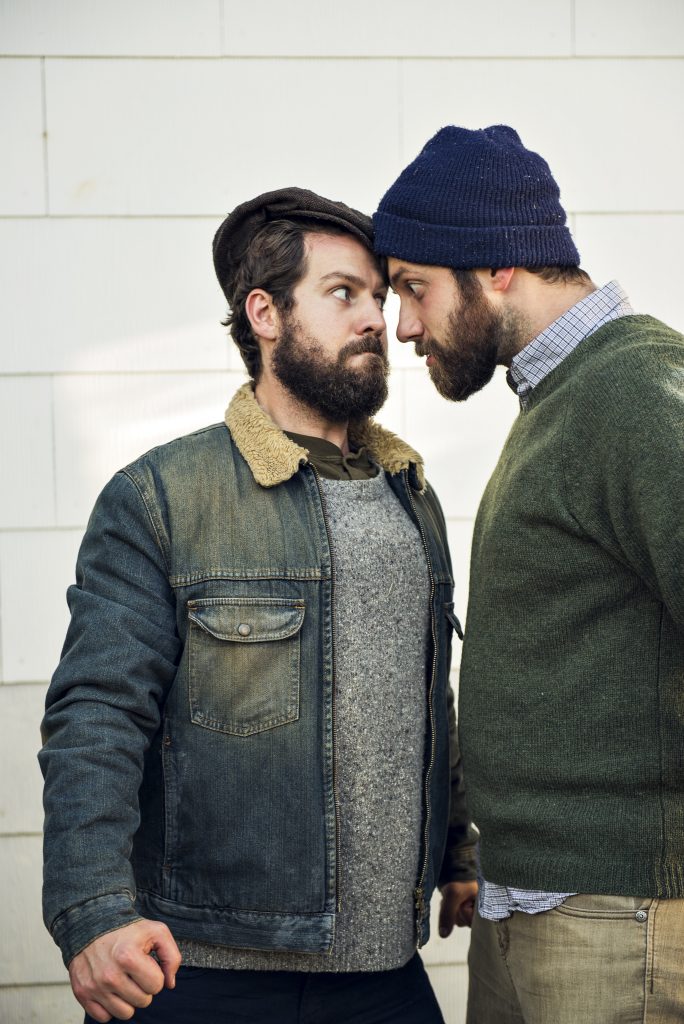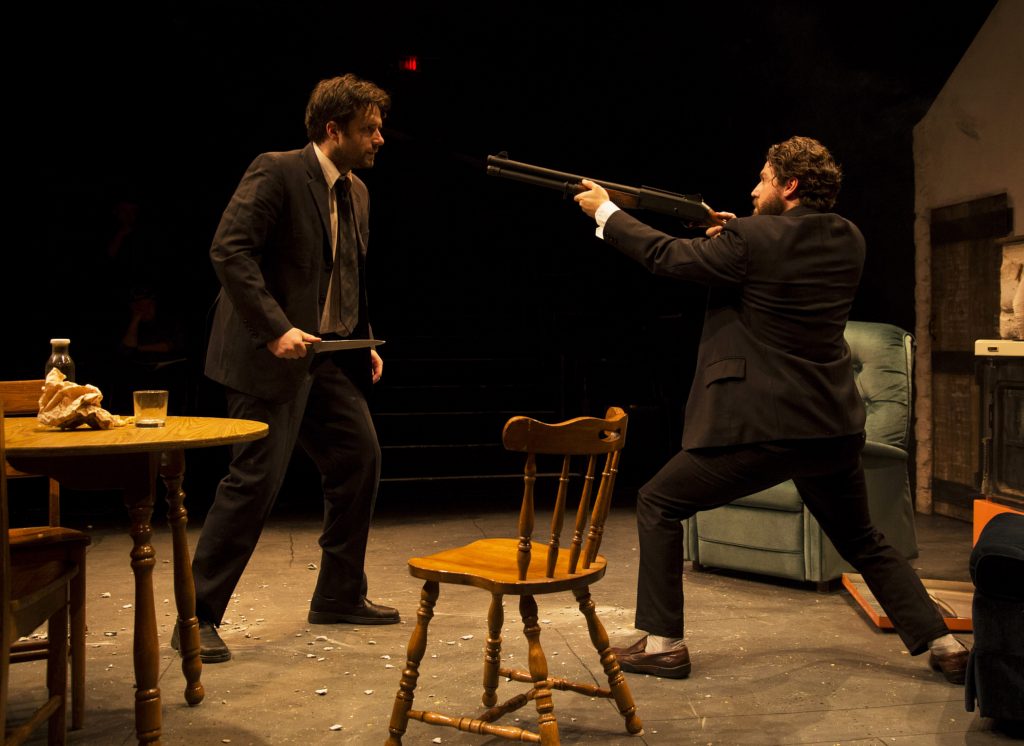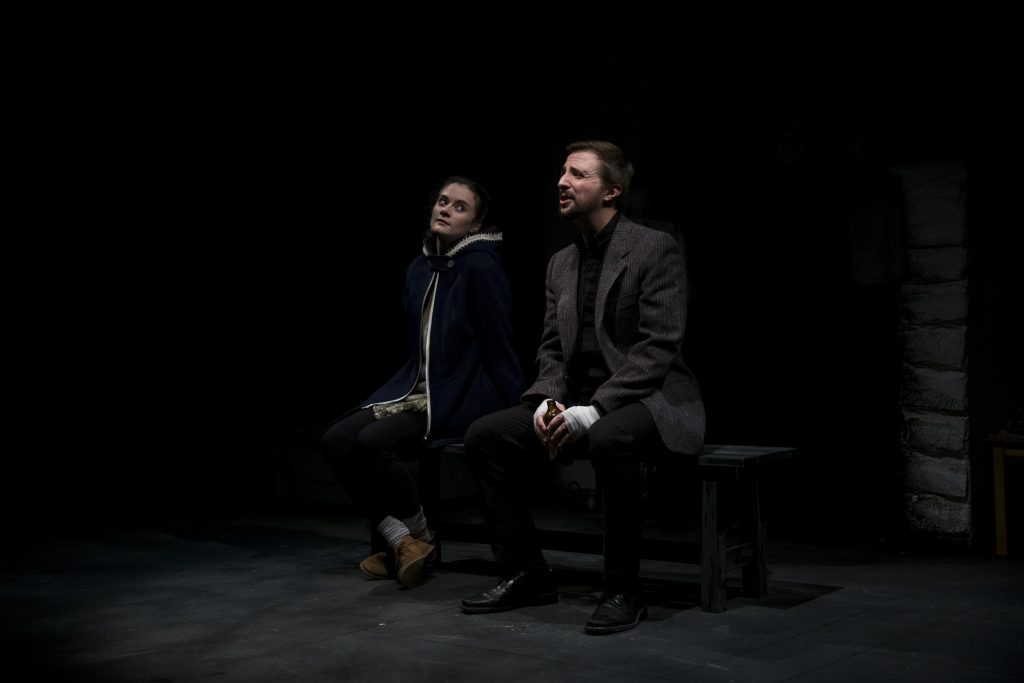
Credit: Emily Cooper
At Pacific Theatre until November 11, 2017
Tickets from $21 at pacifictheatre.org/604-731-5518
Posted October 23, 2017
The Lonesome West is the sort of play that makes you laugh and then makes you embarrassed at having done so – like laughing at someone falling-down drunk. The last in Martin McDonagh’s Leenane Trilogy (The Beauty Queen of Leenane, A Skull in Connemara and The Lonesome West), this play is, like the others, set on the west coast of Ireland in Connemara.
Middle-aged bachelor brothers Coleman (Kenton Klassen) and Valene (John Voth) have just returned home to the family cottage after attending the funeral of their father, killed by a gunshot to the head. Showing no grief at all, the brothers are already well into the bootlegged poteen, that devilish Irish moonshine (40-90% alcohol) when Father Welsh (Sebastien Archibald) drops by and joins in the drinking.
It doesn’t take long for Coleman and Valene to start squabbling and that squabbling to turn into fisticuffs and headlocks. That is the way of The Lonesome West and while you can’t stop laughing at Coleman and Valene, there’s the feeling that you’ve been taken in by clichés of rowdy, drunken Irishmen. But since McDonagh is Irish, maybe he can get away with it.

Credit: Matt Reznek
The language is wonderful. It’s “a biteen” this and “a biteen” that, “feckin’” this and “feckin’” that. The syntax sounds like music: “It’s a terrible priest, I am”, says Father Welsh. The insults are glorious: “You’d steal the shite out of a burning pig”. And the name-calling, hilariously politically incorrect: “virgin, feckin’, gay boy”. Dialect coach Adam Henderson has everyone – including Paige Louter as Girleen – sounding more than a biteen Irish and fight director Josh Reynolds makes the rough and tumble absolutely real; there will definitely be bruises on those bodies each night. Rowdy, rambunctious Irish music – The Pogues, Stiff Little Fingers and others – plays at high decibels during scene changes.
Act 2 is when this so-called ‘dark comedy’ gets less comic and darker. If it hasn’t occurred to you in Act 1, the second act will convince you: these four characters are locked into narrow, pointless lives. Drinking and fighting are how Valene and Coleman deal with loneliness, hopelessness and boredom. They are more to be pitied than laughed at.

Credit: Matt Reznek
Directed by Evan Frayne for Cave Canem Productions and presented by Pacific Theatre, these are four excellent performers. John Voth is big and burly and yet there is something decidedly boyish about Valene, especially in his collection of figurines of the saints which he believes will get him into heaven, and the hoarding of his bags of “crisps”. Like a two-year-old, he guards everything in the house that is his: “my floor, my walls, my table, my chairs” and on and on. Coleman, on the other hand, played by Kenton Klassen is nasty, cunning and sly. He knows exactly how to get Valene riled up and takes wicked pleasure in doing it. Where Voth is slower moving on stage, Klassen is quick, darting and waspish. He stings for the sheer pleasure of causing chaos. As Girleen, Paige Louter is saucy and pert while hiding a longing for the unattainable Father Welsh, who, if he had any brains not completely addled by booze, would dump the Church and run off with her. Against all odds, Sebastien Archibald makes Father Welsh a pitiable character in spite of his drinking and self-loathing. Acting drunk is harder than it looks and Archibald – whom we trust has no experience ‘at all, at all’ in these matters – gets it right.
Perhaps The Lonesome West is a bit too Irish in its complex mix of dark and comic for me. It bothers me that I laughed and didn’t rigorously balk at these familiar stereotypes. Some critic described the characters as “vile, foolish and ineffectual” but they are also sad, lonely and without hope. Life will go on until it doesn’t and in the meantime they will drink and fight. They might even kill each other. Would we still be laughing then? Ah, those Irish playwrights know how to turn the feckin’ screws – and how to make us laugh in spite of ourselves.

